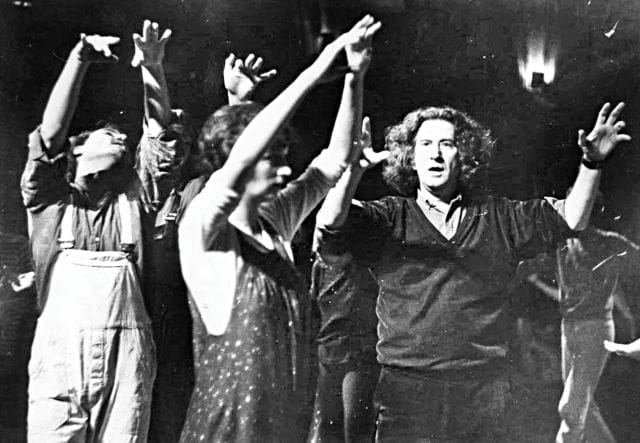Augusto Boal: Turning spectators into “spect-actors”
 Master at work: Augusto Boal with his students.
Master at work: Augusto Boal with his students.
Brazilian theatre director, writer and politician Augusto Boal was born on March 16, 1931 in Rio de Janeiro as the son of José Augustino Mario Charles Boal (a Portuguese baker) and Albertina Chantele Pinto (a housewife). He took an interest in theatre at an early age, preparing skits for family members along with his three brothers, but did not become involved in the theatre scene until after completing his undergraduate degree in Chemical Engineering.
Boal went to New York in 1952, where he studied at the School of Dramatic Arts at Columbia University. In 1956, shortly after graduating, Boal began working with the Arena Theatre in São Paulo, southeast Brazil, directing plays along with José Renato. It was here that he began to experiment with new forms of theatre never before seen in Brazil, such as Stanislavski's 'system' for actors, adapting these methods to social conditions in Brazil.
While working at the Arena Theatre in São Paulo, Boal directed a number of classical dramas, which he transformed to make them more pertinent to Brazilian society and its economy. Among these plays was John Steinbeck's “Of Mice and Men”, known in Brazil as “Ratos e Homens”. As the ratings at the Arena Theatre of São Paulo started to drop in the early '60s, the company decided to start investing in national theatre. Boal then suggested the creation of a Seminar in Dramaturgy at the Arena Theatre, which was quickly implemented and soon became a national platform for many young playwrights.
When a military regime started in Brazil in 1964 -- supported by the Brazilian elite, the church and the middle class, Boal's teachings were considered controversial and threatening by the regime. In 1971, Boal was kidnapped off the street, arrested, tortured, and eventually exiled to Argentina, where he stayed for five years. During that time, Boal published two books: “Torquemada” (1971) and his much acclaimed “Theatre of the Oppressed” (1973).
In “Theatre of the Oppressed”, Boal develops a theatrical method based on “Pedagogy of the Oppressed”, a book by the Brazilian educator and writer Paulo Freire who was also a good friend of Boal. His method, which has been implemented in various communities around the world, seeks to transform audiences into active participants in the theatrical experience. Boal argued that traditional theatre is oppressive since spectators usually do not get a chance to express themselves, and that collaboration between both parties, in contrast allows spectators to perform actions that are socially liberating. It is around this time that invented the term “spect-actor”, a term that he saw as establishing the frameworks within which he wished to work.
After living in Argentina, Boal travelled to other countries in South America such as Peru and Ecuador, where he worked with people in small and usually poor communities that dealt with conflicts such as civil wars and lack of government attention. Boal was of the opinion that only the oppressed are able to free the oppressed. Boal also lived in Paris for a number of years, where he created several centres for the Theatre of the Oppressed, directed plays, and also taught classes at the Sorbonne University. Boal created the first International Festival for the Theatre of Oppressed in 1981.
Boal returned to Brazil after 15 years of exile in 1986, after fall of the military dictatorship. He established a major Centre for the Theatre of the Oppressed in Rio de Janeiro. Boal's work in the CTO made way for the approval of a new law that protects crime victims and witnesses in Brazil. In 1992, Boal ran for city councillor in Rio de Janeiro as a theatrical act, and he was elected. His support staff was his theatre group, with whom he quickly developed various legislative proposals.
In 2008, Augusto Boal was nominated for the Nobel Peace Prize, and in March 2009, he received the title of “World Theatre Ambassador” from UNESCO.
Augusto Boal died on May 2, 2009 at the age of 78 in Rio de Janeiro, of respiratory failure after a long battle against leukemia.
Compiled by Correspondent.

 For all latest news, follow The Daily Star's Google News channel.
For all latest news, follow The Daily Star's Google News channel. 



Comments